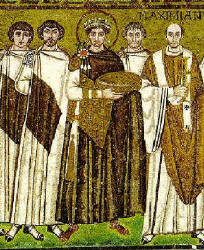Justinian's Digest (De iniuriis) 47.10.15.41-43
Domitius Ulpianus († 223 AD)

Justinian and his Entourage
San Vitale, Ravenna. Mosaic (527-548 AD)
"Quaestionem" intellegere debemus tormenta et corporis dolorem ad eruendam veritatem. Nuda ergo interrogatio vel levis territio non pertinet ad hoc edictum. Quaestionis verbo etiam ea, quam malam mansionem dicunt, continebitur. Cum igitur per vim et tormenta habita quaestio est, tunc quaestio intellegitur. <§ 42> Sed et si iussu domini quis quaestionem habeat, modum tamen excesserit, teneri eum debere Labeo ait. <§ 43> Praetor ait: "Si quid aliud factum esse dicetur, causa cognita iudicium dabo".